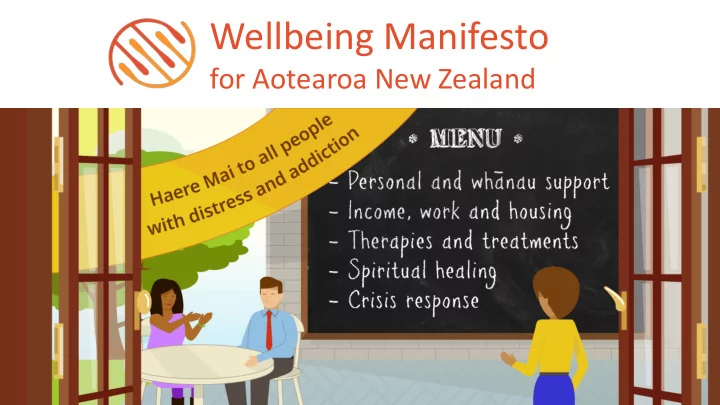

Wellbeing Manifesto for Aotearoa New Zealand
Warnings At the end of this presentation I show an image and voice of Geoffrey Gurrumul Yunupingu who died last year. During this presentation I may say things that upset mental heath professionals. I critique systems not the individuals who work in them.
Background
The Mental Health Inquiry • Mounting public pressure • Broad terms of reference • PM said ‘nothing is off the table’ • Mood for big change • Reports to government 31 Oct 2018 • Wellbeing Manifesto handed over to Inquiry panel on 31 July wellbeingmanifesto.nz
Key messages
Get on your device wellbeingmanifesto.nz
The problem Big Psychiatry sits at the hub of the system shaping the world view, using most of the resources and doing routine harm: • Coercion • Institutionalisation • Narrow focus • Expensive services • Poor and late access • Poor outcomes
Big Psychiatry Big Community Mental disorder – health deficit Mental distress – recoverable life disruption We are about here Health entry point led by medicine Multi entry points led by sectors and on the transition communities from Big Psychiatry Most resources used for ‘pills and pillows’ Resources for a broad menu of services to Big Community Mostly medical and allied professional Equal mix of peer, cultural and professional workers Legacy of paternalism and human rights Commitment to partnerships and human breaches rights Focus on compliance and risk management Focus on access, strengths and life outcomes Responds to risk with coercion and Responds to risk with compassion and compulsion intensive support Colonising and excludes other world views Includes multiple world views
1. The seven wellbeing priorities All people and their whānau: • Live in social conditions to sustain wellbeing, • Have skills and supports to manage stress • Have access to services and supports to recover from mental distress and addiction.
2. Comprehensive responses for all Open access to a full menu of services, supports and opportunities to sustain and restore wellbeing.
3. Peer and cultural workforce Cultural workers and peer workers work alongside the traditional workforce with equal status and in equal numbers.
4. Multi-sector community-led funding All the sectors that have responsibility for wellbeing, distress and addiction - not just health - but social development, justice, corrections and education need to jointly fund a full menu of services at the local level, in partnership with people affected by distress and addiction.
5. Integrated community delivery The services, supports and opportunities need to be based in communities not hospitals, and co-delivered, under as few roofs as possible, in community settings, such as primary health, marae, community centres, schools and large workplaces.
Active government Long term bi-partisan commitment to Big Community: • Articulate the vision • Provide regulation and resources • Fund social inclusion programmes with urgency • Lead public acknowledgement of Big Psychiatry harm • Repeal mental health laws in line with UNCRPD • Measure wellbeing as well as wealth • Invest in first three years of life • Reduce social determinants
Controversial implications
The end of a health-led system Although the health sector and health professionals have a role, a system lead by health will not deliver open access to a full menu of services or better outcomes for people and their whānau. The Manifesto proposes that funding mot going to health services but to pooled multi-sector governance of planning and funding.
Repeal of the Mental Health Act From UNCRPD
Māori ownership Māori need to design and deliver services for Māori.
Big Community and Co-production
Co-production is a way for participants with different expertise to work collaboratively together.
Big Community Co-production Big Psychiatry
Questions and comments Mary O’Hagan mary@peerzone.info 021736452
Recommend
More recommend